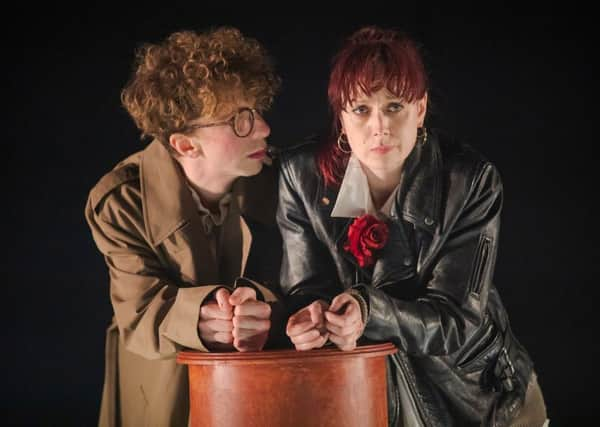Jo Clifford on making a Taming of the Shrew for the 21st century


The show’s success so far, though, still doesn’t explain why Jo Clifford – internationally acclaimed transgender playwright and supporter of women’s rights – should decide to tangle with the text of what is, by 21st century standards, Shakespeare’s most problematic play, the one in which a spirited young woman called Kate is literally tortured into submission by her new husband Petruchio through hunger and sleep deprivation, so that she can find happiness as a perfectly submissive wife. “I was asked to adapt The Taming of the Shrew way back at the beginning of my career,” said Clifford, when the project was announced. “But I hated the bullying and misogyny in the play so profoundly that I turned the commission down. It’s a huge joy to return to the play now and transform it from a queer perspective. So my Shrew no longer supports the patriarchy. Instead it turns it upside down; and it allows us to dream of a matriarchal world.”
Clifford’s transformation of the text goes far beyond the switching of genders, and also involves both a radical cut in the length of the play – this Shrew runs for 75-80 minutes straight through, rather than for two to three hours – and a reorganisation of the different elements of the story, along with a substantial rewriting of the language.
Advertisement
Hide AdAdvertisement
Hide Ad“Shakespeare’s writing is so rich and beautiful, but sometimes incomprehensible to modern ears,” she says, “so every time I adapt a Shakespeare play I go through it in huge detail, trying to maintain the wonderful quality of the language, while updating words and phrases that are going to trip listeners up.
“Then there’s the fact that there are really three plays going on here. There’s the framing story of Christopher Sly, the tinker, who appears in Shakespeare’s introduction to the play as a member of the audience. There’s the rather routine story of Tranio and Lucentio trying to woo Kate’s sister Bianca, in disguise – the stuff of dozens of comedies at the time. And then there’s the central story of Kate and Petruchio, which is the one that really seems to interest Shakespeare.
“What I’ve found, in working on the play, is that all three elements are essential, but there is a qualitative difference in the writing; so it’s easier to rewrite the Sly introduction, and the Tranio-Lucentio elements, than to touch some of the powerful writing around Kate and Petruchio.”
In a production by young English director Michael Fentiman, Clifford’s version of the play features a seven-strong ensemble of Welsh, Scottish and London-based actors, with Scarlett Brookes and Matt Gavan in the key roles of Petruchio and Kate. Lucentio is played by Glasgow-based actor, writer and musician Hannah Jarrett-Scott, who has already scored a huge cross-dressing success in the past year in Pride And Prejudice* (*Sort Of) at the Tron, now about to be revived, and has played a key role in creating and performing the music for Taming of the Shrew, which similarly seeks to link Shakespeare’s story to a 21st century soundtrack.
“In some ways, this has been a quite a tough experience,” says Jarrett-Scott, who plays Bianca’s lovestruck young suitor as a stylish female indie musician, with a purple jacket and slicked-back hair. “I’d say a bit of a whirlwind. The whole text is quite confrontational, quite questioning and brave, and we reached a point where I just couldn’t wait to get it in front of an audience, to see how it would work.
“And for the music, I think we tried to pick songs that had a female vision to them, a female view of life, and love. When I sing these songs, in the show, I feel that I’m singing as Hannah; but then, of course, there are moments in the narrative when I’m obviously being Lucentio, and singing as her.”
The show’s other Scottish actor, Louise Ludgate, has also found aspects of this version of the Shrew challenging, as she plays Kate and Bianca’s patriarchal parent, Baptista, as a glamorous female figure -– “a bit like Cruella De Vil, or Meryl Streep in The Devil Wears Prada.”
“I suppose I’m quite a maternal person,” says Ludgate, “and I find it difficult to get in touch with the part of me that would just want to marry my children off for money, regardless of their feelings. I love what Jo has done with the text, though. It really enables you to explore all the difficulties of what is a very difficult play, and to think what it would really be like if women were in charge – would we oppress and make war and objectify, the way men have done? It’s a great question.”
Advertisement
Hide AdAdvertisement
Hide Ad“The truth is,” adds Clifford, “that we are so used to images of women being abused in our culture, that we can become almost numb to it. Switching the genders in this playful, obviously theatrical way enables us to see the terrible violence of this play with new eyes, and that can be very powerful. It is a new play, in that sense, and I hope it’s a compassionate, multi-layered one. Because in the end, I’m only doing what Shakespeare himself was always doing – taking an old story and making a new one out of it; one you hope people will find funny and moving, and that will also make them think.” - Joyce McMillan
The Taming of the Shrew is at the Tron Theatre, Glasgow, from 20-30 March